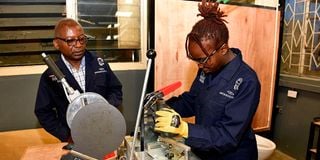Premium
Youth taking up hands-on skills on growing demand

Mr Francis Gitonga (left), an instructor at Don Bosco Boys Town Technical Institute, supervises Velma Ondeche as she operates a Butt welding machine at the school in Karen, Nairobi, on Wednesday last week.
When you first meet Elizabeth Bosibori, a 23-year-old plumbing apprentice, it becomes evident that she doesn't fit the mould of a typical university student.
While many of her peers are engrossed in lecture halls and buried in textbooks, Elizabeth finds herself knee-deep in pipes, wielding a wrench, courageously challenging gender stereotypes in the predominantly male world of plumbing.
Elizabeth's journey into the world of plumbing began last November when she bravely veered away from the conventional academic path to pursue her passion in the construction industry.
“The idea of repairing pipes and handling a variety of tasks has always fascinated me. When the opportunity to apply for a scholarship came, I seized it,” she said.
For Velma Ondete, 19, her journey into plumbing reflects a changing narrative in the world of skilled trades. Velma's perspective on plumbing extends beyond just fixing pipes; she recognises the diverse skills and knowledge required in this field.
"I've come to love this course because it offers me the opportunity to work with my hands,” she said.
In today's changing landscape, the demand for handyman jobs has surged, and Velma acknowledges that people often struggle to comprehend her choice of a profession.
Aston Mendwa, 19, an electronics student, says he’s driven by curiosity and a passion for hands-on work.
“I’ve been always a curious person ever since I was a child. Growing up, I used to wonder how people connect electricity using wires, and I found myself doing that a lot at home,” he says.
Aston actively engages in field operations. This hands-on experience has been a crucial part of his learning journey: “Working with people in the field has been incredibly helpful. Seeing what they do inspires me a lot.”
In a bid to address youth unemployment and bridge the skills gap in construction, Swisscontact Country Director Lilian Ndegwa says the Propeller Project was meticulously designed after an extensive feasibility study that identified the sector as a prime area for growth.
It emerged that, while the industry was ripe for expansion, a significant challenge loomed large — a skills mismatch between graduates and the industry's requirements.
“Graduates sometimes do not enter the job market with the required level of skill, necessitating costly retraining to meet industry standards. Our inspiration came from Switzerland's private sector, where they have effectively influenced curriculum design to align with industry standards and employ apprentices who learn while they work,” says Ms Ndegwa.
She emphasises the vital role well-skilled workers play in propelling industrial growth. She pointed to Switzerland's centuries-old tradition of apprenticeship as an inspiring example that Kenya could learn from.
“In Switzerland, apprenticeships have thrived for over a hundred years, leading to a highly skilled workforce. It's a model worth adopting, and we believe it is part of the solution to address youth unemployment and the shortage of skills in our country," says Ms. Ndegwa.
She says the project will ensure that graduates are equipped with the practical skills required by the construction industry.
The project, she adds, seeks to provide local students with the skills needed to enter the job market and contribute to their organisations immediately. This model, where apprentices learn and work simultaneously, ensures that graduates are highly skilled and job-ready upon completion of their training.




